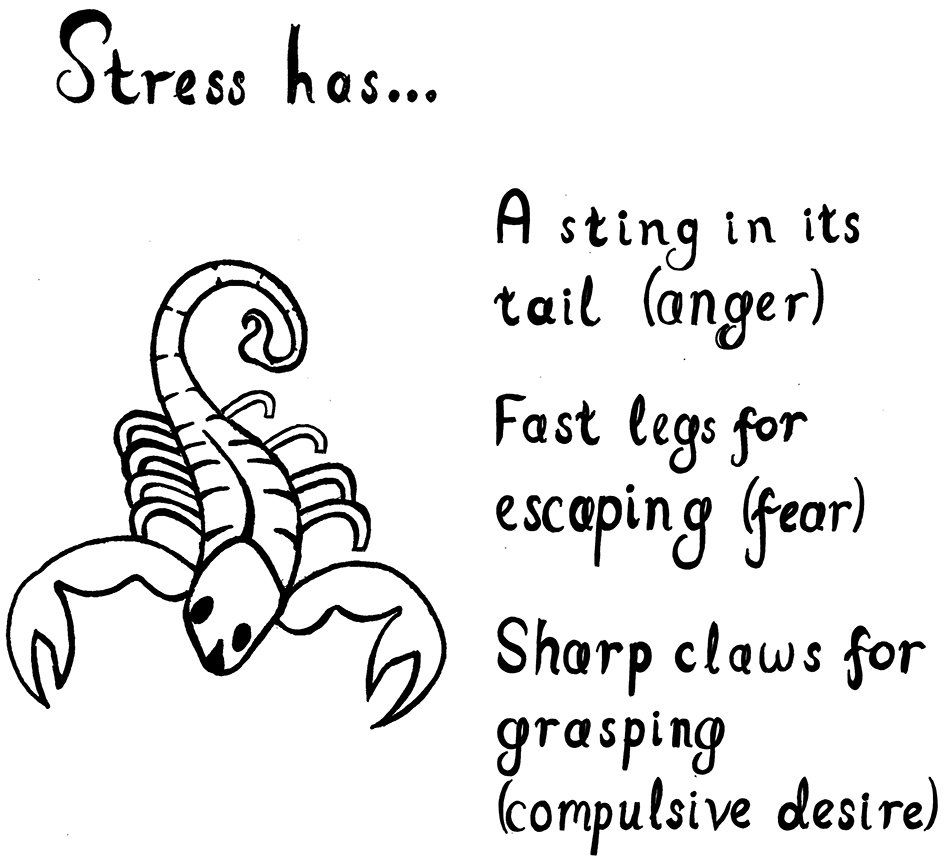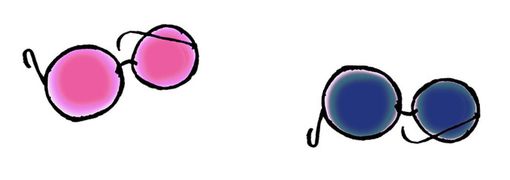Stress Forces
| Stressed Perception
| Stress as a "Scriptwriter" and "Story Library"
| Stressed Motivation
| The Stressed Self
Of the threats we face in the modern day, there can't be many greater than those lying within us - in the form of "stress forces" that can become embedded within our heads (and sometimes within our culture).
*
Look at fear, for instance.
Fear, we might know as an emotion plain and simple, like happiness... even if we might class it as a "negative" emotion, and as one we're best off without. Right?
Yes, fear shows the characteristics of an emotion... but it also shows something very distinct, something not found in many other emotions. In short, fear
is a bullying "force" that can take over completely.
No happiness or joy takes over completely and bosses us around in the way that fear
can.
We can be happy, but being happy doesn't mean we're lost to our faculties.
When happy, we still have a calmness of mind, and the "mental space" to be able to respond to our environment and think.
Our happiness doesn't stop us responding appropriately - and sensitively - to what's going on around us.
*
Fear does not work this way.
Fear is all about taking control, to leave us little more than a puppet. Hence the everyday expressions, to be "scared out of my wits" or "frightened out of one's skin".
As such, the case can be made that fear shouldn't be classed as a standard emotion - if doing so brackets fear
alongside emotions like happiness or surprise.
Fear, surely, is a far more domineering kind of "beast", even a kind of tyrant that steals our whole identity the way that emotions like joy and even (gentle) sadness do not.
*
Besides fear, there are other "forces" that behave the same way - as "bullies" - including
anger and
compulsive desire.
Again, non-stressed emotions seem to behave entirely differently - in that they don't take away our true free will.
We're still given the space to be curious and interest, inspired and happy... without any of these emotions taking over.
But anger, we all know, can be treacherous. Before we know what's happening, all of a sudden anger
can shove our mind out of the way and take a decision on our behalf - a decision that we might regret for the rest of our life, if it causes us to make a rash judgement or shatter a cherished relationship in a moment of hostility.
Desire can be just the same when it's compulsive - as when a moment of greed makes us be so selfish that, again, we attach too much importance on our acquisition of some superficial "desire object" (a family heirloom, for example, that we snatch from its intended recipient). Before we know it, greed can cause us to "lose the wood for the trees" - and squander a friendship more precious than any material possession.
*
In saying all this, to understand the likes of fear, anger
and compulsive desire in their full context, it's helpful to look at their "biological purpose".
At a time of survival crisis, these "stress forces" might even play an essential role, and their ability to take sole charge of us might even help us to stay alive.
When our simple survival relies on our having sufficient brute toughness, our biology switches us over to "stress mode", and we become a little like a scorpion:

As such, we can find ourselves equipped with the “snatching claw” of compulsive desire, to make us cling onto persons and things that can bring us survival benefit... along with the “fleeing legs” of fear and the “stinging tail” of anger, for highlighting survival “threats” to escape or fight.
*
Just in case we imagine that the "stress forces" of compulsive desire, fear and anger take control at a moment of crisis - and then leave us alone - we need to think again.
No. These also affect the whole way we see.
Take anger, which makes us “see red”, so “the red mist descends” and we fly at whichever neighbours it wishes to have sent crashing through the garden fence.
Fear sounds alarm at its targets, and has them look so scary that we run like fury to the hills and prairie.
Compulsive desire fixes us with “rose-tinted spectacles”, and imparts an alluring sparkle to the “objects” it sets for us to chase.
All of which brings us to another "stress force", because as we all know, those “rose-tinted spectacles” can quickly turn to "blue-tinted spectacles" - in the sense that where we fail to win whichever person or thing might be the "object" of our desire, we might find our mood plummet, to the extent that we are left "down in the dumps", and "blue".
Gloom, being compulsive desire
in reverse, kicks up a fuss when we fail to turn “desire objects” into conquests. When these slip through our fingers, compulsive desire
turns mean and changes tune completely, its sparkle dust and gleam giving way to bleakness in the extreme.
Compulsive desire’s
rose-tint dayglow goes up in smoke as we’re now enfolded in a bluesy shadow. The ficklest of mistresses is this compulsive d., that now gives up the ghost and dumps us at the side of the road... by flipping into gloom, its complete antithesis.

